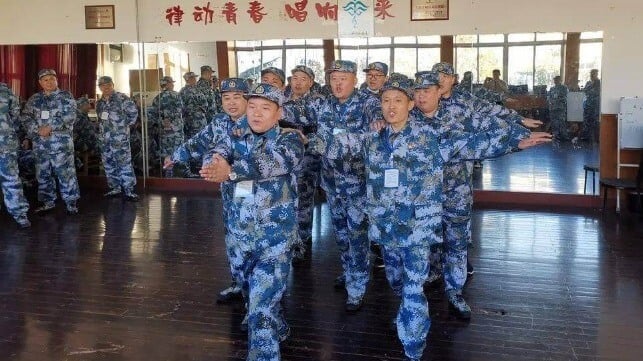COSCO Ships Still Carry a Communist Party Commissar Aboard

Though it may not be well known abroad, China's state-owned merchant ships often carry a Chinese Communist Party political commissar amongst their crew. This post has responsibilities unlike any found aboard a Western-managed vessel - including national defense functions.
According to a new review by Conor M. Kennedy, assistant professor at the U.S. Naval War College’s China Maritime Studies Institute, the majority of China's ship commissars are former political officers from the People's Liberation Army - particularly aboard ships operated by state-owned China COSCO, the world's largest shipowner.
The commissar - originally known as the "deputy captain" during the Mao era - is responsible for security and personnel matters, including employee evaluations, shipboard social life, crew cohesion and company standards, along with political training and Party branch management. They are technically second-in-command after the master.
The commissar system is rooted in a history of centralized control and state ownership, and where more modern systems of crewing and management have been implemented, it has encountered difficulties. The limited availability of highly skilled commissars is also a challenge, as is the generational turnover in shipping, as newer crewmembers may be more interested in social media than in Chinese Communist Party activity. These factors have taken a toll on the profession.
"The ship political commissar career is generally viewed as a dead end with few prospects for advancement, unlike the career trajectory of other ship officers and technical positions," writes Kennedy. "The political functions of the role and standing among the crew has weakened."
Under the guidance of President Xi Jinping, China COSCO has attempted to renew its commissar system through retraining, vetting and recruitment, with some success. Its commissars were reportedly effective in helping manage the impact of COVID-19 quarantine measures on crew cohesion during the pandemic, and they were tasked with assisting crewmembers and maintaining good order during the crew change crisis.
The shipboard Party branch and the commissar have a role to play in preparing for war. "Militia armed work" has been part of the job description for some ship commissar posts in years past, reflecting the role of Chinese shipping's contribution to military logistics.

that matters most
Get the latest maritime news delivered to your inbox daily.
The best-known branch of China's maritime militia is its fleet of government-funded, paramilitary-crewed trawlers, but its deep-sea merchant ships also have a role. China's military has experimented with kits to convert boxships into underway replenishment vessels, and it has carried out multiple exercises to test out the use of civilian ro/ros for amphibious assault.
The commissar plays an ideological and organizational role in preparing a state-owned ship for defense tasking, according to Kennedy. This is particularly true for high value ro/ro assets of the Bohai Ferry Group, where the political commissar has an unusual "dual command" responsibility alongside the captain. Certain COSCO ferries may also have a similar arrangement with heightened responsibilities for the Party's onboard representative. "Having former military officers serving in a capacity to assert political control and discipline and help captains ensure the vessel is available to carry out military or national tasks is likely the desired goal. The Party Branch on board serves as an important guarantee of this," writes Kennedy.
